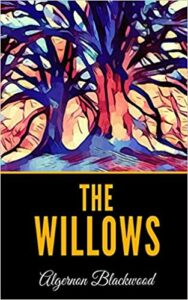( Bookshop.org | Project Gutenberg | Amazon.com )
The Willows by Algernon Blackwood
ISBN-13 : 978-1081920890
Available: Hardcover, paperback, Kindle edition, audiobook, Project Gutenberg
Having just finished T. Kingfisher’s book The Hollow Places, I discovered in the afterword that she had been inspired by a novella by Algernon Blackwood titled The Willows, which was much admired by H.P. Lovecraft as an example of horror and weird fiction. The story follows the narrator and his traveling companion (referred to throughout as “the Swede”) as they journey down the Danube River, which is almost a character in the story. Having left the town of Pressburg during a rising tide, with the threat of a storm on the way, they are washed out of the main channel of the river and into a wilderness of islands, sandbanks, and swamp covered with willow bushes, a “separate little kingdom of wonder and magic… with everywhere unwritten warnings to trespassers.”
With the waters still rising and the winds blowing the two find an island large enough to camp on that they are sure they will not be washed away. The rising water, the shouting wind, the crumbling islands, and the masses of willows all together create a sense of unease and terror in the narrator, which he tries to dismiss by focusing on practical matters. He and his companion avoid speaking about their current situation, even when all they have to occupy themselves with is conversation. Alone, collecting driftwood for the fire, the narrator describes the willows as “utterly alien,” a vast army of “innumberable silver spears”. Although he suspects his companion shares his feelings of disquiet, the two men don’t speak about their unease. After their first night on the island, the narrator sees that the islands, covered in willows, have moved closer to their own, which is washing away. His companion has discovered that they cannot leave right away, though, because one of their steering paddles is missing, the second has been filed so it will break on usage, and there is now a hole in the bottom of their canoe, and believes the damage was done to make them victims of a sacrifice. The narrator, not wanting corroboration for his feelings of unease and fear, attempts to come up with logical explanations, but neither of the two can really believe them. Both men are terrified of their upcoming fate, but his companion advises him that it’s best to neither talk nor think of the willows who may be searching them out and hope that, in their insignificance, the creatures of the “beyond region” they have strayed into, will fail to find them.
A camping trip with a friend doesn’t sound like it would be ominous and terrifying, but Blackwood’s vivid descriptions of the natural world and the narrator’s disintegrating state of mind turns what seems at first like a river inlet filled with willow bushes that might be a good place to stay overnight, into an unnatural, dread-inducing enviroment. It’s creepy in the “I can’t believe these characters slept at all on the island” kind of way. You will never look at willows without seeing them as sinister again.
Blackwood’s descriptions of the willows as an “unearthly region” where the beings “have nothing to do with mankind” marks this story as an early work of weird fiction, and you can clearly see the influence on Lovecraft’s work. It’s easy to see why Blackwood is considered a master of the genre. Highly recommended.
Note: I read the Project Gutenberg edition of this novella, not the one pictured above.





Follow Us!